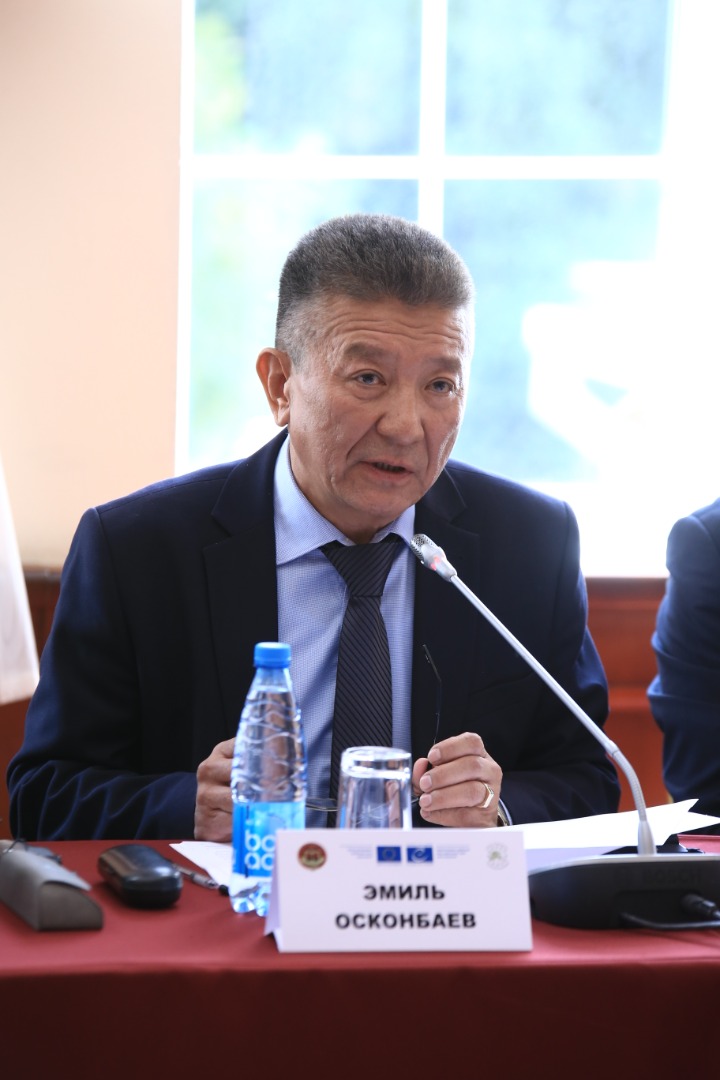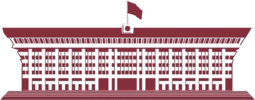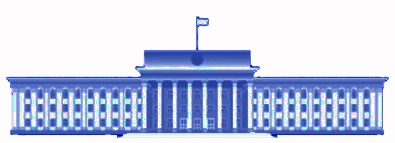Independence of the judiciary in the context of constitutional reforms

| Video of the speech is available here: https://www.youtube.com/watch?v=3XkVIFZltic
|
Unofficial translation
International conference on the theme “Independence of the judiciary in the context of constitutional reforms”, September 16, 2022.
Chairman of the Constitutional Court of the Kyrgyz Republic Mr. Emil Oskonbaev
“Limits of interaction between the judiciary and other branches of government»
Dear conference participants!
While still a judge of the Constitutional Chamber of the Supreme Court, having repeatedly participated in resolving issues of the competence of the country’s state authorities, I came to the unequivocal realization that the problems of their interaction are due to an insufficient understanding of the role of each of them precisely from the point of view of the principle of separation of powers and the system of checks and balances.
Involuntarily comes to mind an excerpt from Krylov’s fable “The Swan, crayfish and Pike”:
When there is no agreement among comrades,
Their business will not go well,
And nothing will come out of it, only torment.
With regard to the problems of interaction between the branches of state power, the moral of the fable is that things are still there if there is no consistency and coherence in the work of state authorities, the tasks and functions of which are prescribed in the Basic Law, i.e. without an effective system of separation of powers, it is impossible to ensure their proper functioning, and, consequently, interaction.
In accordance with the Basic Law of the country, the Kyrgyz Republic is a democratic state. Democracy finds its expression, first of all, in democracy, since only the people of the Kyrgyz Republic, being the bearer of sovereignty, is the only source of state power, as well as the separation of powers into legislative, executive and judicial authority.
In the Kyrgyz Republic, the principle of separation of powers was first proclaimed in the Declaration on State Sovereignty of the Republic of Kyrgyzstan dated December 15, 1990, which determined that state power in the republic is exercised on the basis of its division into legislative, executive and judicial authority. On May 5, 1993, this principle was included in the Constitution of the independent Kyrgyzstan as one of the unshakable foundations of the constitutional order of the Kyrgyz Republic.
The principle of separation of powers is an essential prerequisite for the rule of law and one of the fundamental principles of the democratic organization of the state. This form of organization of the state consists in a special form of building state power on the basis of – the unity of the system of state power on the one hand, and on the other its division into legislative, executive and judicial branches of power.
At a certain stage of the historical development of the state, namely from the moment of independence, as well as the adoption of the Constitution of the already independent Kyrgyzstan, a shift in the value paradigm took place in the country, i.e. the hierarchy of constitutional values has radically changed.
Thus, if the Constitution of the Kyrgyz SSR of April 20, 1978, which was in force until 1993, fully met the requirements of the Soviet ideology on the supremacy of the interests of the state represented by a single party – the Communist Party of the Soviet Union, which controlled all state and public affairs, then the Constitution of May 5, 1993 established human rights and freedoms in the system of values as absolute and inalienable, and the subsequent constitutions of the country absolutely resolutely proclaimed human rights and freedoms as the highest value of the Kyrgyz Republic.
Human rights and freedoms act directly, determine the meaning and content of the activities of all state bodies, local self-government bodies and their officials.
In other words, the proper protection of constitutional values depends entirely on the coordinated functioning and interaction of all branches of government. Our Constitution, consolidating the triad of state power, prioritizes ensuring their harmonious functioning, which, on the one hand, acts as a guarantee of a democratic and legal state, and on the other – is a necessary condition against the concentration of power in the hands of one branch and abuse of it.
The principle of separation of powers arising from Article 4 of the Constitution, without being limited to the distribution of functions between various bodies of state authorities, presupposes a mutual balance between them so that none of them can gain a dominant position over others in concentrating the fullness of power in one hand.
And this balance is achieved by a system of “checks and balances”, which is manifested in the powers of state bodies of different branches of government, allowing them to influence each other, at the same time interact in solving the most important state tasks.
And precisely here the idea of the rule of law is clearly expressed, pursuing the goal of limiting the powers of the state by law, i.e. the rule of laws is established, the regime of which is provided by the judicial branch of government.
In the light of the above, it should be emphasized that the theme of today’s conference for the body of constitutional control is extremely relevant in that the Constitutional Court being the highest body of judicial power, exercising constitutional control through constitutional proceedings in order to protect constitutional values, resolves disputes about competence between the branches of state power.
This power of the Constitutional Court, however, which appeared in 2021 as a result of the constitutional reform in the country, is aimed at ensuring conditions that contribute to the coordinated functioning and interaction of all branches of government.
Due to this, the body of constitutional control occupies a very significant place in the system of state authorities, since it, acting as an arbiter between political actors, carries out constitutional proceedings with their participation, as a result of which the norms of the Constitution are reflected in every decision it makes.
From the relatively recent history of the functioning of the previous body of constitutional control, and here we are talking about the Constitutional Chamber of the Supreme Court, most of those present here are probably aware that only thanks to the decisions of the Constitutional Chamber, it was repeatedly possible to avoid political crisis situations that could damage the mutually agreed implementation of the powers and functions of the branches of the state authorities.
Thus as an example, I would like to cite the case considered by the Constitutional Chamber in 2014, where the Government was the appealing party, and the Parliament was the defendant.
This a dispute arose between the indicated branches of power because of the norm of the Law “On the republican budget of the Kyrgyz Republic”, according to which the relevant committee of the Parliament had to give consent to the approval of the development budget, which was specified after the adoption of the law, i.e. at the stage of implementation of the law on the republican budget. The Constitutional Chamber came to the conclusion that the procedure established by the legislator for coordinating the planning of capital investments from the republican budget with the relevant committee of the Jogorku Kenesh cannot be carried out at the stage of implementing the law on the republican budget. Granting the relevant committee, the authority provided for by the contested legislative provisions at this stage of the budget process is interference in the activities of the Government for the execution of the republican budget, which contradicts part 3 of Article 5 of the Constitution and violates the principle of separation of state power.
Or another example, showing how the Supreme Court and the Parliament of the country ended up on opposite sides of the barricade. Then the Constitutional Chamber assessed the constitutionality of paragraph 35 of part 1 of Article 3 of the Law «On the Regulations of the Jogorku Kenesh of the Kyrgyz Republic» and recognized the contested norm as contrary to the Constitution (the Decision was made on April 24, 2019).
The body of constitutional control found that the regulatory effect of the contested norm, which establishes the authority of the Jogorku Kenesh to hear annual information on the activities of the judicial system, goes beyond the powers of the Jogorku Kenesh established by the Constitution and leads to violation of such constitutional values as the principle of independence of the judiciary and the principle of separation of powers. An attempt to represent this authority as arising from the representative functions of the Jogorku Kenesh cannot substantiate its constitutionality.
The inadmissibility of an explicit assessment by the Jogorku Kenesh of information about the activities of the judiciary not only allows maintaining a balance between the legislative and judicial branches of power, but also indirectly indicates that there is no need for the Chairman of the Supreme Court to directly present such information.
At the same time, based on the principle of openness and responsibility of state bodies, the judicial system should not be closed, and information about its activities should be available both to the public and to the Jogorku Kenesh (Article 3 of the Constitution). In this regard, the form and methods of providing information to the public about the activities of the judiciary should be determined by the Supreme Court independently. Information may be provided to the Jogorku Kenesh exclusively on the initiative of the judiciary itself.
Of course, ensuring the interaction of the branches of government is a complex process, especially the parliament and the servants of Themis, since, the legislature power determines the judicial and legal system, the status of judges, the procedural order for considering cases, and moreover, elects judges of the Supreme Court and the Constitutional Court, on the one hand, and on the other the judicial authorities are empowered to check the normative legal and other acts adopted by public authorities in general, including parliament, and in exceptional cases, through administrative and constitutional proceedings cancel their effect, resolve disputes about competence between the branches of state power.
The basis of the relationship between the executive and judicial branches of power is the issues of ensuring human and civil rights and freedoms, compliance with the law, enforcement of court decisions, ensuring the execution of the budget of the judicial authorities.
Regarding the budget of the judiciary, it should be noted that the importance of financing the activities of judicial authorities is indicated by Article 99 of the Constitution of the Kyrgyz Republic, which establishes that the state shall provide funding and appropriate conditions for the functioning of courts and the work of judges.
Courts shall be financed from the state budget and shall ensure the possibility of full and independent administration of justice, otherwise insufficient funding of the judicial system may directly affect the quality of the administration of justice.
Unfortunately, the task of ensuring at least a two percent share of the expenditure part of the budget for financing the judiciary for a long time did not find its practical implementation, due to the fact that the budget of the judiciary although it is formed independently by the judiciary, the last word remains with the executive and legislative branches of power in the form of coordination with the budget of the judicial system.
Currently, the State Target Program “Development of the judicial system of the Kyrgyz Republic for 2019-2022” (approved by the resolution of the Jogorku Kenesh dated February 26, 2020) outlines the task of ensuring at least a two percent share of the expenditure part of the budget for financing the judicial system in stages, which will be aimed at improving the material and technical base, increasing wages for judges and employees of the court apparatus, etc.
Summarizing my report on this positive note, I would like to note that the protection of the principle of separation of powers is extremely important and necessary, since it is characterizing the Kyrgyz Republic as a truly democratic state. The protection of the Basic Law in the context of ensuring a system of checks and balances is carried out by the Constitutional Court by interpreting the principle of separation of powers and keeping each of the authorities within the limits of their competence outlined by the Constitution on the basis of this principle, which ultimately contributes to the harmonious interaction of all branches of government and their proper functioning.
Thank you for your attention!







